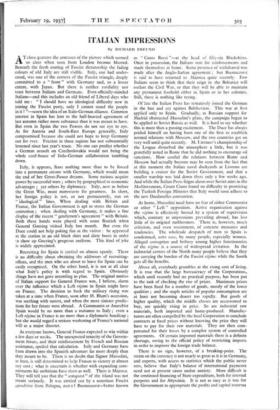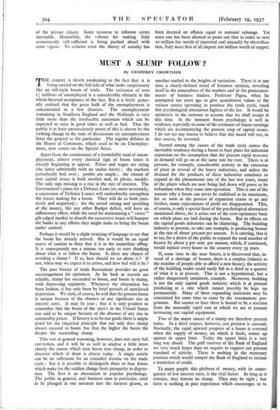ITALIAN IMPRESSIONS
By RICHARD FREUND -
AT close quarters the contours of the picture which seemed so clear when seen from London become blurred. Beneath the fresh coating of Fascist dictatorship the fading colours of old Italy are still visible. Italy, one had under- stood, was one of the corners of the Fascist triangle, deeply committed to a " front " with Germany and, to a lesser extent, with Japan. But there is neither cordiality nor trust between Italians and Germans. Even officially-minded Italians—and this includes an old friend of Liberal days who told me : "I should have no ideological difficulty now in joining the Fascist party, only I cannot stand the people in it ! "—scorn the idea of an halo-German alliance. Common interest in Spain has lent to the half-hearted agreement of last autumn rather more substance than it was meant to have. But even in Spain the two Powers do not see eye to eye. As for Austria and South-East Europe generally, Italy compromised because she could not hope to keep Germany out for ever. Friction in these regions has not substantially lessened since last year's truce. No one can predict whether a German assault on Czechoslovakia would not bring the whole card-house of Italo-German collaboration tumbling down.
• Italy, it appears, fears nothing more than to be forced into a permanent entente with Germany, which would mean the end of her Great-Power dreams. Some nations acquire power by successful wars ; others by geographical or economic advantages ; yet others by diplomacy. Italy, now as before the Great War, must manoeuvre for greatness. In short, her foreign policy is not, or not permanently, run on " ideological " lines. When dealing with Britain and France, the Italian Government is apt to stress the German connexion ; when dealing with Germany, it makes a fine display of the recent "gentlemen's agreement" with Britain. Both these hands were played with some flourish when General Goering visited Italy last month. But even the Duce could not help poking fun at the visitor : he appeared at the station in an old black shirt and dirty boots in order to show up Goering's gorgeous uniform. This kind of joke is widely appreciated.
Recruiting for Spain is carried on almost openly. There is no difficulty about obtaining the addresses of recruiting- offices, and the men who are about to leave for Spain can be easily recognised. On the other hand, it is not at all dear what Italy's policy is with regard to Spain. Obviously things have not gone according to plan. The original motive of Italian support for General Franco was, I believe, alarm over the influence which a Left regime in Spain might have on France. The decision to back the military rising was taken at a time when France, soon after M. Blum's accession, was seething with unrest, and when the most sinister predic- tions for her future were abroad. A Communist or Anarchist Spain would be no more than a nuisance to Italy ; even a Left regime in France is no more than a diplomatic handicap ; but she would regard a serious weakening of France's national will as a major disaster.
As everyone knows, General Franco expected to win within a few days or weeks. The unexpected tenacity of the Govern- ment forces, and their reinforcement by French and Russian assistance, spoiled that calculation. Italy and Germany have teen drawn into the Spanish adventure far more deeply than they meant to be. There is no doubt that Signor Mussolini, at least, is still determined to help Franco to victory at almost any cost ; what is uncertain is whether with expanding com- mitments his ambitions have risen as well. There is Majorca. They will tell you that the "conquest" Of the island was not meant seriously. It was carried out by a notorious Fascist squadrista from Bologna, name I Buonaccorsi--better known as "Conte Rossi "—at the head of fifty-six Blackshirts. Once in possession, the Italians sent for reinforcements and made themselves at home. Some pretence of withdrawal was made after the Anglo-Italian agreement ; but Buonaccorsi is said to have returned to Majorca quite recently. Few I Aims seem to think that their reign in the Balearics will outlast the Civil War, or that they will be able to maintain any permanent foothold either in Spain or in her colonies. Still, there is nothing like trying.
Of late the Italian Press has tentatively joined the German in the hue and cry against Bolshevism. This was at first applied only to Spain. Gradually, as Russian support for Madrid obstructed Mussolini's plans, the campaign began to be applied to Soviet Russia as well. It is hard to say whether this is more than a passing excitement. The Duce has always prided himself on having been one of the first to establish normal relations with Moscow, and the two countries got on very well until quite recently. M. Litvinov's championship of the League disturbed the atmosphere a little, but it was gratefully noted in Rome that he did nothing to encourage oil sanctions. How cordial the relations between Rome and Moscow had actually become may be seen from the fact that at this moment the Italian naval dockyards at Livorno are building a cruiser for the Soviet Government, and that a smaller warship was laid down there only a few weeks ago. And while the Italian Press feigns alarm over Soviet aims in the Mediterranean, Count Ciano found no difficulty in promising the Turkish Foreign Minister that Italy would soon adhere to the new Dardanelles convention.
At home, Mussolini need have no fear of either Communist or other " Left " opposition. Active organisation against the re'gime is effectively barred by a system of supervision which, contrary to impressions prevailing abroad, has lost little of its original ruthlessness. There is, however, much criticism, and even resentment, of concrete measures and tendencies. The wholesale despatch of men to Spain is condemned, solo voce, by many people, especially women. Alleged corruption and bribery among higher functionaries of the regime is a source of widespread irritation. In the industrial centres of the North many people believe that they are carrying the burden of the Fascist regime while the South gets all the benefits.
Above all, everybody grumbles at the rising cost of living. It is true that the large bureaucracy of the Corporations, which until recently had no practical purpose, has been put to the task of checking the rise of prices. Maximum prices have been fixed for a number of goods, mostly of the lower qualities ; and the staple articles of popular consumption are at least not becoming dearer too rapidly. But goods of higher quality, which the middle classes are accustomed to buy, are quickly rising in price. So are industrial raw materials, both imported and home-produced. Manufac:. turers are often compelled by the local Corporation to conclude contracts at fixed prices without knowing the price they will have to pay for their raw materials. They are then com- pensated for their losses by a complex system of controlled agreements. Of certain imported materials there is a definite shortage, owing to the official policy of restricting imports in order to improve the foreign trade balance.
There is no sign, however, of a breaking-point. The strain on the currency is not nearly as great as it is in Germany, and experts, with access to statistics which the public never sees, believe that Italy's balance of international payments need not at present cause undue anxiety. More difficult is the continued financing of State expenditure, both for internal purposes and for Abyssinia. It is not as easy as it was for the Government to appropriate the profits and capital reserves of the private citizen. Some recourse to inflation seems inevitable. Meanwhile, the Echeme for making Italy economically self-sufficient is being pushed ahead with some vigour. To criticise even the theory of autarky has been decreed an offence equal to national sabotage. Yet some one has been allowed to point out that in order to save to million lire wtorth of imported coal annually by electrifica- tion, Italy must first of all import too million worth of copper.















































 Previous page
Previous page